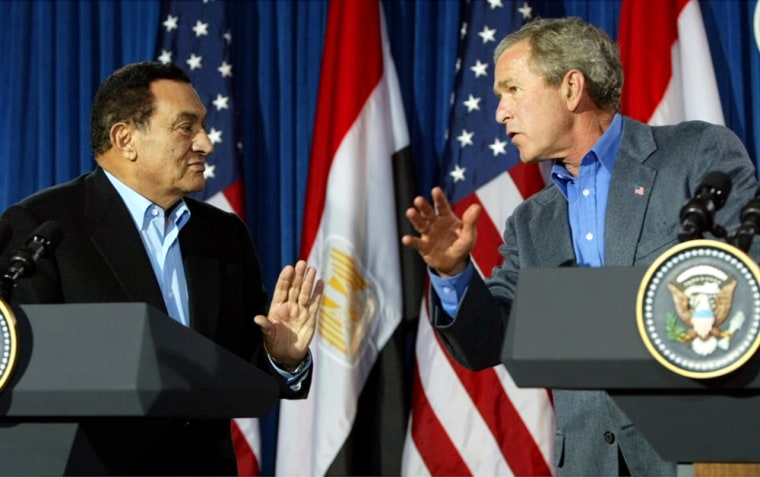President Bush and Egyptian President Hosni Mubarak said Monday that they would welcome Israel’s withdrawal from Gaza as a positive step toward a Middle East peace agreement but stressed that it must be part of an overall agreement that would establish a Palestinian state.
Mubarak also reaffirmed a commitment to Bush to help in forging an accord, but he did not say whether Egypt was willing to play a security role in Gaza should Israel pull out.
“I think any withdrawal from the occupied territory is very highly appreciated,” Mubarak told reporters following a private meeting at Bush’s ranch.
Mubarak said, however, that withdrawal from Gaza alone would not be enough. “It will not be accepted by the public opinion in the area,” he said.
Bush, who is scheduled to meet with Israeli Prime Minister Ariel Sharon later this week, said, “If he were to withdraw from the Gaza, it would be a positive development.”
During their meeting, Bush and Mubarak discussed prospects for reviving Middle East peace efforts and Israel’s plan to close 21 Jewish settlements in Gaza. Mubarak pledged that his country would do “whatever it takes” to revive efforts to strike a peace settlement between Israelis and Palestinians.
Bush offered an appeal for true peace in the entire Middle East, “not just a pause between wars.”
Qualifying his endorsement, the president said withdrawal would not replace the U.S.-backed road map for a negotiated settlement between Israel and the Palestinians. “It is part of the road map so that we can continue progress toward the two-state solution,” he said.
“We also believe the future of the Middle East and the future of Iraq are closely linked,” Bush said. “The people of the greater Middle East have a right to be safe, secure, prosperous and free.”
Arabs suspicious about Sharon plan
Mubarak is on his first visit to the United States in two years.
Like other Arab leaders, Mubarak is leery that the Israeli plan might be Sharon’s way to hold on indefinitely to other occupied Arab land.
While the proposal calls for closing all 21 Gaza settlements, it would shut down only four of 140 Jewish settlements on the West Bank.
In a letter to Bush, Jordan’s King Abdullah II expressed his strong support of America’s two-state solution for the Palestinian-Israeli conflict, the official Petra news agency said Sunday.
For Bush and Israel, a key issue is the kind of role Mubarak would play to keep a lid on the volatile Gaza area. Gaza borders Egypt’s Sinai Peninsula, and Egypt administered the strip before the 1967 war.
The United States would like Mubarak’s help in ensuring that Gaza does not fall into anarchy, which would make it a haven for terrorist elements. Egypt could control the border so that weapons did not cross into Gaza, and it could mediate among various Palestinian factions.
Apparently, Mubarak is willing to guard Egypt’s side of the border and to train and equip Palestinians to take charge of security on their side. Egypt has ruled out policing Gaza itself.
Martin Indyk, a former U.S. ambassador to Israel, had no doubt that Bush was going to bless Sharon’s plan. “Absolutely, that’s the choreography,” he said.
After first keeping its distance from Sharon’s proposal, the administration has warmed gradually to the withdrawal idea, provided it is linked to a more sweeping agreement with the Palestinians.
The Iraq factor
Potentially eclipsing Israel in the Bush-Mubarak talks are the deaths of hundreds of Iraqis in the past week in battles between insurgents and U.S.-led coalition forces.
Mubarak and Abdullah are arguably America’s best Arab friends, and they are having a hard time justifying that friendship to their own citizens with the United States’ increasingly being portrayed as the aggressor in Iraq.
The siege of Fallujah has been described in the Arab press as collective punishment on Iraqis there for the crimes of a few. That has deep resonance in Egypt, where Israel often is accused of collectively punishing the Palestinians.
“Egypt’s view is that the U.S. occupation is reinforcing anti-American feelings — and the current violence only heightens that problem,” said Tamara Cofman Wittes, a research fellow at the Brookings Institution’s Saban Center for Middle East Policy.
More than 600 Iraqis — most of them women, children and elderly people — have been killed in a week of fighting in Fallujah alone, the director of the city’s hospital told The Associated Press. A Marine commander said most of the dead were probably insurgents.
Bush's democracy push
Mubarak also was likely to seek details from Bush on his Greater Middle East Initiative, which would ask European and other developed states to push for Arab democracy. Mubarak has resisted outside pressure on the issue.
Concern over exactly what the United States might pressure Arabs to do and disagreements over how to respond to that pressure contributed to the decision to cancel the Arab summit scheduled in Tunisia last month.
Mubarak, who is trying to revive the summit, may want to take to other Arab leaders reassurances by Bush that they will be able to decide the pace and direction of reform themselves.
Mubarak and Abdullah are in the moderate camp of leaders who acknowledge that the Arab world needs reform, but they insist that it is Arabs who should be in charge of that effort.
The United States has been interested for many years in reforms like the privatization of the Egyptian economy. Mubarak has no designated successor, and he rules under a state of emergency.
The group Human Rights Watch complains that the Egyptian government continues to crack down on civil society and organizations critical of government policies. Mubarak also has failed to address the widespread practice of torture by security forces or change laws and policies that discriminate against women and minorities, the group says.
